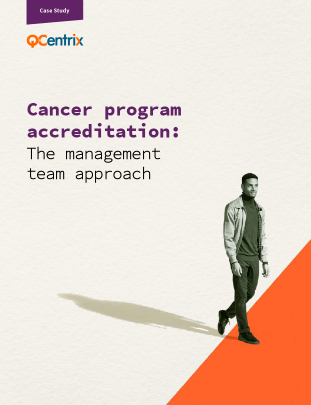

Cancer Data Management
Starting anew
Recent changes in the oncology registry data requirements necessitate a brand-new workflow for the oldest registry in the market.
Stewards of your data
Oncology healthcare is changing; from an ageing population with higher risk factors to advancements in cancer detection and treatment technology. Clinical data has become crucial to enhance both the effectiveness and growth of oncology departments.
Working with more than 250 oncology programs across the country, Q-Centrix's enterprise approach helps transform oncology clinical data into your most valuable and powerful asset. Our comprehensive portfolio of solutions includes cancer data management, cancer registry operations, and oncology program management. Enhanced by our state-of-the-art cancer data software and analytics, the Q-Centrix team is more than equipped to steward your oncology data through a rapid transformation.
The Q-Centrix ODS-C team spans more than 40 years of cancer data management experience.
Our cancer data management expertise
American College of Surgeons National Cancer Database
- Commission on Cancer (CoC)
- National Accreditation Program for Breast Centers (NAPBC)
- Nation Accreditation Program for Rectal Cancer (NAPRC)
American College of Surgeons National Cancer Program
- Cancer Registry Operations
- Accreditation Management Programs
How we work
The foundation of every Q-Centrix cancer partnership is meaningful, high-fidelity data.
Cancer Data Management
Our team of ODS-Cs manage all aspects of the data from comprehensive case finding to abstraction through state registry submission with industry-leading quality assurance.
Cancer Registry Operations
Lean on our team of oncology clinical data experts to do all of the clinical data tasks to maintain your accreditation including IRR, RCRS and NCDB submissions, meeting attendance, policies, and follow-up metrics for compliance.
Cancer Program Accreditation Support
Let us guide your facility through a proven management program that features templates and tools, analytics, analysis and continual assessments, meeting support, and survey attendance and preparation.

The intersection of clinical, registry, and research data
The push to treat patients with precision medicine techniques has driven the expansion of clinical research in oncology. Today, the need for centralized, connected data is greater than ever.
Karen Schmidt, Vice President Oncology Market Lead, and Victor Wang, Senior Vice President of Data and Research discuss the untapped potential of registry data in helping hospitals enhance oncology research capabilities, drive operational efficiency, and address accreditation challenges.
Proven oncology experience
250+
Oncology Program Hospital Partners
185+
CoC Accredited Partners
250+
Oncology Data Specialists
150,000+
Patients Abstracted Annually
299,000+
NCDB Cases Submitted Monthly

Case study
The case for cancer accreditation
The Commission on Cancer (CoC) accreditation has clear advantages over being a National Cancer Institute Designated Cancer Center, despite the conflicting results of accreditation. Yet the challenges to achieving accreditation remain. Learning the accreditation process on top of other duties can limit the effectiveness of the documentation provided, delay the granting of accreditation, and take staff time away from other important work.
What We Know:
- As the largest body of accreditation, CoC compliance provides structural organization for cancer care that conforms to the highest standards, providing effective mechanisms for impacting cancer care and allowing the institution to participate in standards development.
- Third parties offer experience and objectivity to assess issues, suggest solutions, and implement changes without burdening internal teams.
- Data that is high-fidelity, timely, complete and secure is the first step toward accreditation.
- Using the same technology at all sites and across departments increases data oversight and quality assurance, allowing clinical leadership to implement changes that result in better whole-person care, reduced costs, and easier preparation for accrediting reviews.



